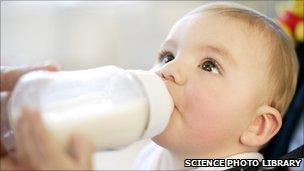EU bans bisphenol A chemical from babies' bottles
- Published

The European Commission has announced a ban on the use of bisphenol A (BPA) in plastic baby bottles from next year.
The commission cited fears that the compound could affect development and immune response in young children.
There has been concern over the use of BPA for some time, with six US manufacturers removing it in 2009 from bottles they sold in the US, although not other markets.
But a UK expert said he thought the move was "an over-reaction".
BPA is widely used in making hard, clear plastic and is commonly found in food and drink containers.
A European Commission spokesman said the proposal had been approved after being presented to a committee of national government experts on Thursday - months earlier than scheduled - and approved.
The European parliament had called for the ban in June.
Areas of uncertainty
John Dalli, Commissioner in charge of Health and Consumer Policy, said the ban was good news for European parents.
"There were areas of uncertainty, deriving from new studies, which showed that BPA might have an effect on development, immune response and tumour promotion," Mr Dalli said in a statement.
EU states will outlaw the manufacture of polycarbonate feeding bottles containing the compound from March 2011, and ban their import and sale from June 2011, the Commission said.
But Professor Richard Sharpe, of the Medical Research Council's Human Reproductive Sciences Unit at the University of Edinburgh, said the commission's decision must have been made on political, rather than scientific, grounds.
"I do not know of any convincing evidence that bisphenol A exposure, in the amounts used in polycarbonate bottles, can cause any harm to babies as not only are the amounts so minuscule but they are rapidly broken down in the gut and liver.
"Babies have the necessary enzymes and are able to metabolise bisphenol A just as effectively as adults."
He added: "Personally I think this is an overreaction, but if satisfactory replacements chemicals are available then this can be done to placate those calling for action, but scientifically it's a retrograde step.
"I would be happy for a baby of mine to be fed from a polycarbonate bottle containing bisphenol A."
And Professor Warren Foster of the department of obstetrics and gynaecology at Canada's McMaster University, said the EU had acted with "extreme caution".
Mimicking
The National Childbirth Trust is a British charity which has campaigned for the ban.
Its chief executive Belinda Phipps told the BBC: "When you put liquids into a bottle - particularly hot liquids or liquids containing fatty liquids - it leaches out of the plastic. And particularly as the bottle gets older and it gets more scratched, more and more leaches out and into the liquid."
Ms Phipps said that when a baby drinks from a bottle which contains BPA, the baby absorbs the leached chemical into its fat.
"It's a chemical that mimics oestrogens, but not in a good way," she said. "It interferes with oestrogens getting into the receptors, and it can have some very unpleasant effects - and animal studies have shown significant effects."
Canada was the first country to declare bisphenol A toxic, external in October, after it was concluded that the chemical might have harmful effects on humans, as well as the environment and "its biological diversity".
The Canadian decision was strongly opposed by the chemical industry.